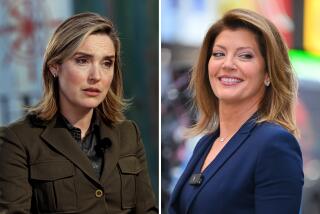Shut Out of the Debates, Nader and Buchanan Have Plenty of Company
- Share via
Though seriously seeking the Oval Office, Jeffrey B. Peters won’t share the stage with Al Gore and George W. Bush during Tuesday’s presidential debate in Boston. That’s not keeping Peters from making a splash: He plans to toss gutted TV sets into Boston Harbor to protest the exclusion of third-party candidates from the debates.
“This is the Boston TV Party!” said Peters, who is campaigning under the We the People banner. “Instead of the tyranny of King George, we’re fighting our two-party system and its corrupt collusion with big corporations and TV networks.”
For the nation’s scores of third-party presidential candidates, these are tough days, the political equivalent of not getting asked to the high school prom.
They are fighting back with lawsuits and the Internet, but the only place you’ll find Pat Buchanan, Ralph Nader or any other third-party hopeful Tuesday evening is outside the debate hall doors.
They need not take the slight in any way personally. Third-party candidates have been getting the brushoff since 1960, when Congress modified a 1934 law that had required any broadcast station staging a debate to welcome all candidates. Congress suspended that rule to let Richard Nixon and John F. Kennedy square off by themselves in the first televised debates.
Though advocates of the current system say it only makes sense to narrow the field to those with a legitimate chance, others say democracy suffers in the process.
The task of selecting who appears in presidential debates now is shepherded by a special nonprofit commission selected by the Republican and Democratic hierarchy.
Not surprisingly, the bipartisan Commission on Presidential Debates, established in 1987, has set the bar far higher than the current crop of third-party candidates can jump, mandating they score at least 15% in nationwide polls. Nader is the closest thing, with about 5%.
“All the way around it, the fix is being put in,” said Buchanan, the Reform Party’s nominee, calling the debate commission “a front group for the two parities to maintain control of the White House forever.”
Undaunted, the Buchanan campaign has challenged the snub in court, arguing that voters deserve to see him in the campaign’s brightest spotlight because the conservative commentator has received $12.6 million in taxpayer-subsidized campaign funds. Nader and an independent New York group are waging separate legal fights, saying debate sponsorship by corporations, such as AT&T; and Anheuser-Busch, amounts to unrestricted campaign contribution far exceeding the federal limits.
So far, none of the legal challenges has gone anywhere.
Officials of the debate commission did not return repeated phone calls seeking comment. But the group’s co-chairman, Paul G. Kirk Jr., recently likened the debates to sports: “You either win enough games or you don’t get to make the playoffs.”
George Getz, a Libertarian Party spokesman, counters that letting hand-picked commissioners decide who debates is akin to “letting the head coaches of the Redskins and Cowboys decide who plays in the Super Bowl.”
Bay Buchanan, a chief strategist for her brother, grouses that the major parties already have “boatloads of money; all the consultants and pollsters. What are they afraid of?”
Ross Perot and Jesse Ventura.
In 1992, Perot’s wildcat presidential run got a big boost when he shinnied onto a prime-time debate beside Bill Clinton and President Bush. Perot was excluded from the debates in 1996.
More recently, in 1998, Ventura used TV debates in Minnesota to jump from single digits in polls to the governor’s mansion.
Bruce Cain, a UC Berkeley political science professor, argues that the 15% poll showing requirement seems unfairly high. He recommends 5% but also admits that any barrier is arbitrary.
Cain suggests a mix of debates, with early ones for a broader array of candidates, then later ones featuring two or three top contenders.
“It certainly would broaden the political dialogue,” Cain said. “As it is, we’re homogenizing it; keeping it safe, narrow.”
Some suggest the hard hand of capitalism may eventually help third-party contenders. Several recent polls have found that nearly 2 in 3 voters want a broader slate of candidates in the debates. To juice up ratings, TV networks might eventually press to have a fiery outsider included.
More to Read
Get the L.A. Times Politics newsletter
Deeply reported insights into legislation, politics and policy from Sacramento, Washington and beyond. In your inbox twice per week.
You may occasionally receive promotional content from the Los Angeles Times.










